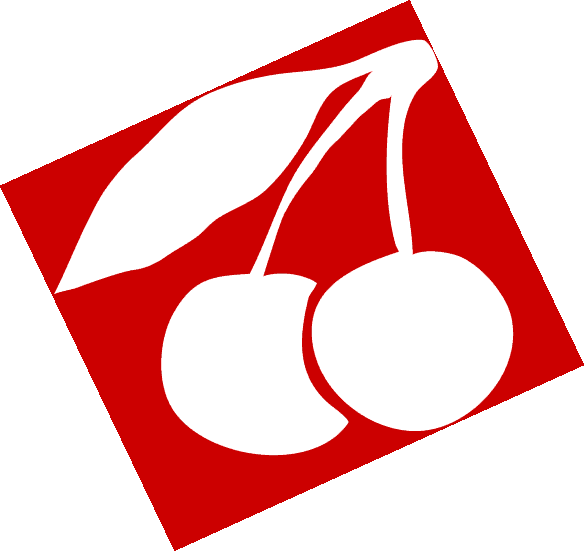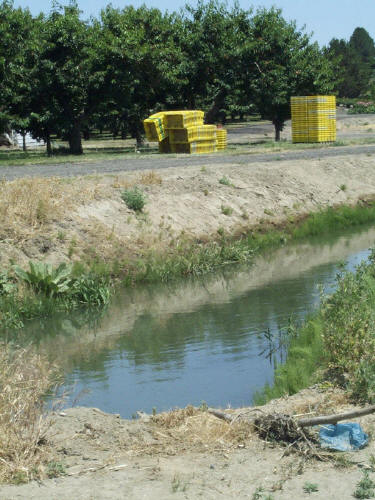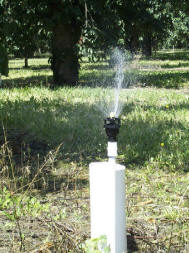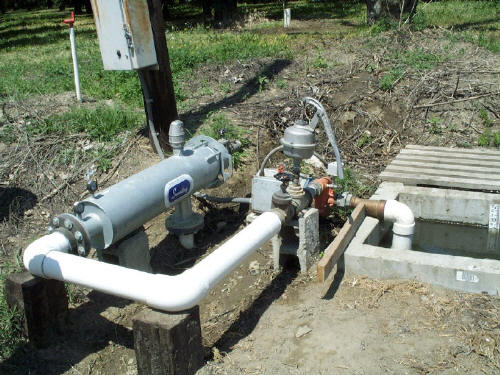

Growing premium fresh sweet cherries since 1918
IRRIGATION
Our orchards are located in the Yakima Valley of
Washington State. Unlike the more well-known western portion of
Washington, our region is classified as a desert. We receive less than 7
inches of rainfall per year, on average. As a result, we rely on an
elaborate irrigation system that starts with the melting of mountain snow pack
over 100 miles away.
 From the
five mountain reservoirs that collect the runoff,
the water is carried via rivers and man-made canals. We receive our water
through regulated wier boxes and valves owned and operated by the local
irrigation districts. We own rights to this water that we pay for,
allowing us to receive our allotted amount. This water is then pumped to
our orchards and distributed via large grids of sprinklers that were designed
and built by Olmstead Orchards.
From the
five mountain reservoirs that collect the runoff,
the water is carried via rivers and man-made canals. We receive our water
through regulated wier boxes and valves owned and operated by the local
irrigation districts. We own rights to this water that we pay for,
allowing us to receive our allotted amount. This water is then pumped to
our orchards and distributed via large grids of sprinklers that were designed
and built by Olmstead Orchards.
One of the most important
horticultural practices that affect fruit quality is irrigation. From the
time the canals fill in early April, we begin irrigating.
 Our
watering cycle depends on the stage of development and the weather. During
the spring and fall, much less water is used than in the hot summer months of
June, July, and August. One reason is that the soil dries out
quickly in the hot months and needs more water to sustain the trees and fruit.
In addition, the fruit is in a critical stage of development as the weather
heats up, requiring more water.
Our
watering cycle depends on the stage of development and the weather. During
the spring and fall, much less water is used than in the hot summer months of
June, July, and August. One reason is that the soil dries out
quickly in the hot months and needs more water to sustain the trees and fruit.
In addition, the fruit is in a critical stage of development as the weather
heats up, requiring more water.
Our sprinklers spray water on
the ground, not on the branches or fruit. This keeps the water from
being absorbed by the leaves or the fruit, which can cause splits in the
cherries.
 Water
on the trees can also promote powdery mildew, that can ruin an entire crop.
We also irrigate for longer periods of time to make sure the water in the soil
is not only near the surface, forcing shallow root systems. However, we
also have to be careful not to over-saturate the soil and cause root rot in the
trees.
Water
on the trees can also promote powdery mildew, that can ruin an entire crop.
We also irrigate for longer periods of time to make sure the water in the soil
is not only near the surface, forcing shallow root systems. However, we
also have to be careful not to over-saturate the soil and cause root rot in the
trees.
The irrigation system is very costly to build and takes a lot of maintenance, but we would not be able to farm without it. Sprinklers and pump filters often get clogged with debris from the open irrigation canals. Sprinklers also occasionally get run over by a tractor of four-wheeler and need to be repaired. The pumps that are used are also susceptible to breakdown and need to be maintained and repaired.
© 2003-2008 Olmstead Orchards, Inc. 360 Frazer Road Grandview, Washington 98930
Last updated Monday June 02, 2008 Website problems: webmaster@olmsteadorchards.com
Site by CH Design